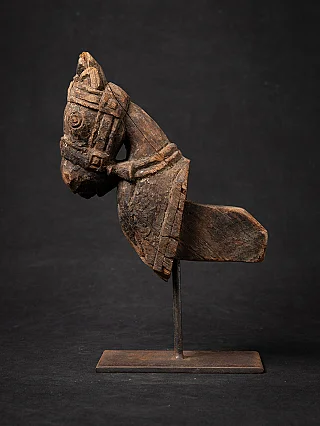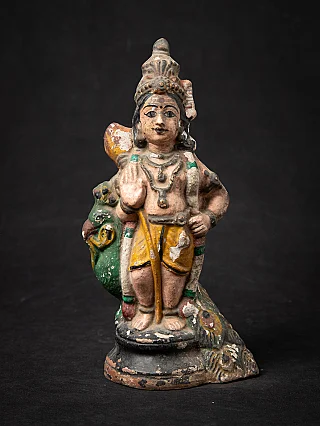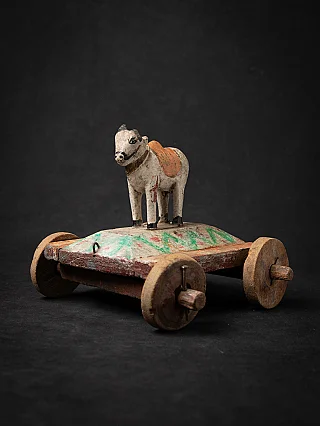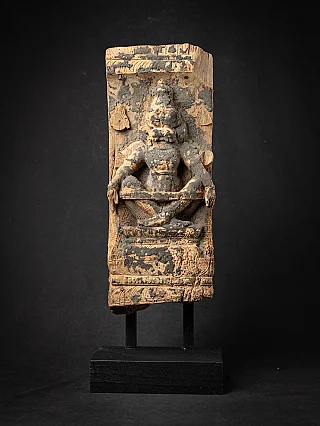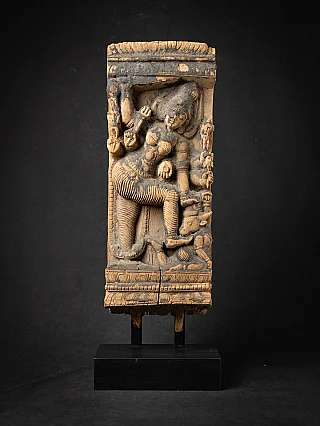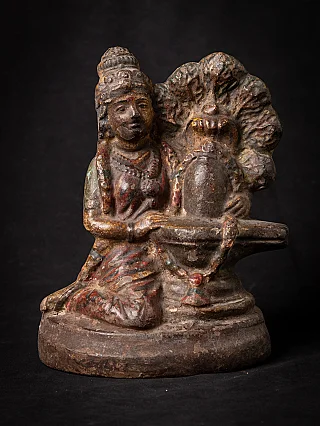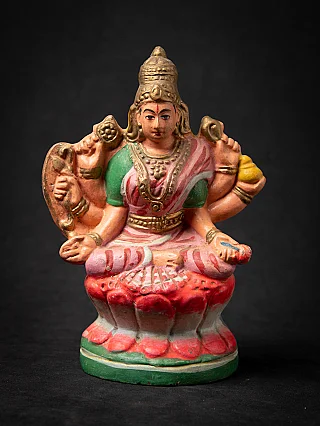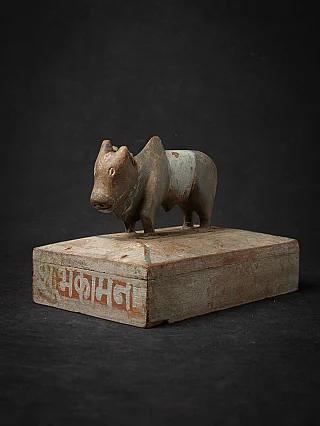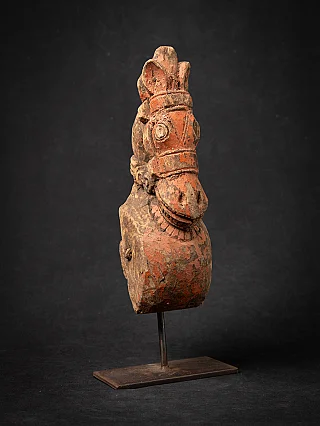Avatars in Hindu Mythology
Author : Peter Vredeveld
Hindu mythology is replete with fascinating narratives of divine incarnations known as "avatars." These avatars represent the embodiment of the divine, each serving a unique purpose in maintaining cosmic balance and imparting profound teachings. Lets explore the various avatars in Hindu mythology, their significance, the stories and myths behind them, the cultural significance of avatars and how to incorporate avatars into your life.
"The soul is neither born, and nor does it die."- Bhagavad Gita
What Are Avatars in Hindu Mythology?
In Hindu mythology, avatars are incarnations of deities, often Vishnu, who descend from the spiritual realm to the earthly realm in various forms. These divine incarnations serve multiple purposes, including the preservation of dharma (righteousness) and the restoration of cosmic order.
View our all Hindu God Statues
1. Matsya (The Fish)
Matsya, the first avatar of Lord Vishnu, is often depicted as a fish. In this incarnation, Lord Vishnu saved humanity and the sacred scriptures during a catastrophic flood. Matsya's appearance symbolizes protection and preservation.
2. Kurma (The Tortoise)
Kurma, the second avatar, takes the form of a giant tortoise. It played a pivotal role in the churning of the cosmic ocean to obtain the nectar of immortality. Kurma represents patience and support.
3. Varaha (The Boar)
In the form of a boar, Lord Vishnu's third avatar, Varaha, lifted the Earth from the cosmic ocean, saving it from being submerged. Varaha stands for strength and protection.
4. Narasimha (The Man-Lion)
Narasimha, the fourth avatar, combines human and lion attributes. This fierce form protected his devotee Prahlada by defeating the demon king Hiranyakashipu. Narasimha symbolizes divine courage.
5. Vamana (The Dwarf)
Vamana, the fifth avatar, appears as a dwarf Brahmin. He outwitted the demon king Bali, who had gained control over the universe. Vamana embodies humility and wisdom.
6. Parashurama (The Warrior with an Axe)
Parashurama, the sixth avatar, wields an axe. His purpose was to destroy oppressive Kshatriya rulers. Parashurama represents the divine warrior spirit.
7. Rama (The Prince of Ayodhya)
Rama, the seventh avatar, is renowned for his role in the epic Ramayana. He embodies righteousness, duty, and heroism. Rama's story serves as a guide to ethical living.

8. Krishna (The Divine Playful Boy)
Krishna, the eighth avatar, is known for his wisdom and divine teachings in the Bhagavad Gita. He represents the divine aspect of joy, love, and devotion.
9. Buddha (The Enlightened One)
Lord Buddha, the ninth avatar, introduced principles of compassion and non-violence. His teachings continue to influence millions on their spiritual journeys.
10. Kalki (The Future Warrior)
Kalki, the future avatar, is yet to appear. It is believed that Kalki will end the present age of darkness and restore righteousness. Kalki symbolizes hope and transformation.
11. Hayagriva (The Horse-Headed Avatar)
Hayagriva, a lesser-known avatar of Lord Vishnu, possesses a horse's head. He is associated with knowledge and wisdom, particularly the Vedas.
12. Dhanvantari (The Physician Avatar)
Dhanvantari, another less-recognized avatar, embodies the art of healing. He is revered as the divine physician and the source of Ayurveda, traditional Indian medicine.
13. Mohini (The Enchantress)
Mohini, a captivating female avatar of Lord Vishnu, played a crucial role in the churning of the cosmic ocean by using her allure to help the gods obtain the nectar of immortality.
14. Narada (The Divine Sage)
Narada, known for his celestial music and wisdom, is a divine sage and a messenger between the gods.
The Stories and Myths Behind Avatars
The narratives surrounding these avatars are not just fascinating tales; they also impart profound teachings. For instance, the story of Lord Rama in the Ramayana teaches the values of righteousness, duty, and sacrifice. Lord Krishna's role in the Mahabharata and the Bhagavad Gita imparts wisdom, ethics and the path to spiritual liberation.
"You have the right to perform your prescribed duties, but you are not entitled to the fruits of your actions."- Bhagavad Gita
The Cultural Significance of Avatars
Avatars hold immense cultural significance in Hinduism. They symbolize the eternal cycle of creation, preservation and destruction. Furthermore, they serve as a source of strength, inspiration, and guidance for devotees. The belief in avatars helps maintain cosmic balance (dharma) and reminds us of our moral responsibilities in the world.
How to Bring Avatars into Your Life
Incorporating avatars into your life can be a spiritually enriching experience. Here are some ways to do so:
- Home Shrine Setup: Create a sacred space in your home with avatar statues and offerings.
- Meditation and Worship: Use avatar imagery as a focal point for meditation and worship.
- Attending Festivals and Rituals: Participate in festivals and rituals dedicated to specific avatars.
Conclusion
Avatars in Hindu mythology are not just figures of worship; they are embodiments of divine teachings, ethics, and cultural significance. By understanding and appreciating the avatars, we can gain insights into the essence of Hindu spirituality and the eternal cycle of creation and preservation.
People Also Asked
- Who are the 12 avatars in Hinduism?
The 12 avatars, known as Dashavatara, are a list of incarnations of Lord Vishnu, a primary deity in Hinduism. The traditional list includes:
- Matsya (the fish)
- Kurma (the turtle)
- Varaha (the boar)
- Narasimha (the half-man, half-lion)
- Vamana (the dwarf)
- Parashurama (the warrior with an axe)
- Rama (the prince of Ayodhya)
- Krishna (the divine statesman)
- Balarama (elder brother of Krishna)
- Buddha (the enlightened one)
- Kalki (the future warrior on a white horse)
- Which God has 24 avatars?
We consider Lord Dattatreya to have 24 avatars. Dattatreya is a combined form of the Hindu trinity Brahma, Vishnu, and Shiva.
- Who are the four avatars of Hinduism?
The term "avatar" is commonly associated with Lord Vishnu. The four primary avatars of Vishnu are:
- Matsya (the fish)
- Kurma (the turtle)
- Varaha (the boar)
- Narasimha (the half-man, half-lion)
- Who is the 9th avatar of Shiva?
There must be a widely recognized concept of Shiva having avatars like Vishnu. Devotees regard Lord Shiva as a god having manifestations or forms (not avatars). The 9th form of Shiva is sometimes associated with Lord Bhairava, a fierce and wrathful aspect of Shiva.
- Who is the 11th Shiva avatar?
There isn't a specific widely accepted list of Shiva avatars, but Rudra is considered an essential aspect of Shiva, and devotees consider him as an aspect akin to an avatar.
- What are the 64 forms of Shiva?
The number 64 is often associated with the Shaiva tradition, referring to the 64 forms or manifestations of Lord Shiva, known as the Chaturashiti Shaktipeethas. Each of these represents a different aspect of Shiva's divine power. The details of these forms may vary across other traditions and texts.
Share this page

























